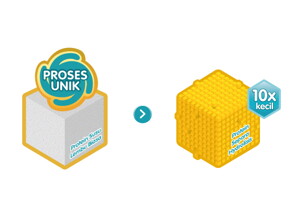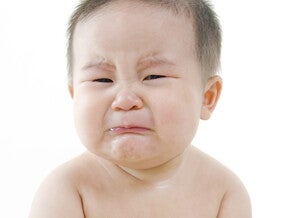
Benefits of Probiotics for Children
HEALTHY GUT, STRONG PROTECTION. Whenever we think of a child's immune system, we picture white blood cells and antibodies moving like soldiers to defeat the germs in the body.
HEALTHY GUT, STRONG PROTECTION
Whenever we think of a child's immune system, we picture white blood cells and antibodies moving like soldiers to defeat the germs in the body. But do you know that your child has another line of defense against germs?
GUT PROTECTION FROM GERMS
In your child's gut lives more than 500 species of bacteria. We call them the intestinal microflora. Among them are bacteria call Bifidobacteria and Lactobacili which are the good guys that help protect your child from germs. These good bacteria help your child in several ways:
• They produce antigens that stimulate, train and help mature your child's immune system (without actually harming your child) so that it functions optimally.
• They help create a healthy digestive system in your child's gut, which allows for optimum digestion and absorption of nutrients.
• They also prevent potentially harmful germs from invading and growing in your child's gut.
However, studies also showed that the number of good bacteria in your child's gut may decrease during the weaning period. Don't worry, however, because you can help your child maintain his beneficial intestinal microflora and strengthen his natural defense against germs.
PROBIOTICS - GOOD FOR GUT HEALTH
"Probiotics" are beneficial live bacteria that, when ingested by your child in an adequate amount, will help maintain and even increase the population of beneficial intestinal microflora in your child's gut. If you want to help strengthen your child's protection from germs, giving him foods with addedprobiotics is a good way to start!
WHEN YOUR CHILD HAS GUT INFECTION
Vomiting, diarrhoea, tummy pain, and fever – these are possible signs that your child may be suffering from gut infection or gastroenteritis. Caused by bacteria, viruses and other types of germs, this is a common ailment among young children below the age of 5. Many children have more than one episode a year, and in most cases, the infection can clear within a few days.
What should I do when my child has gut infection?1
In addition to following the doctor's advice, here are some things you can do to help your child recover and to prevent the infection from spreading to other family members.
• The important thing you should do while caring for your child is to ensure that he has plenty of water to drink. Your child will lose plenty of body fluid due to vomiting and diarrhoea, and the fluid lost will need to be replaced. So encourage your child to drink extra water during this period.
• Be careful to wash your hands after changing nappies and before preparing, serving, or eating food.
• Regularly clean the toilets used with disinfectant. Also, clean the flush handle, toilet seat, sink taps, bathroom surfaces and door handles daily with hot water and detergent.
• If a potty is used, wear gloves when you handle it, dispose of the contents into a toilet, then wash the potty with hot water and detergent and leave it to dry.
• Make sure your child washes his hands after going to the toilet; before and after eating.
• If clothing or bedding is soiled, first remove any faeces into the toilet. Then wash in a separate wash at as high a temperature as possible.
• Don't let your child share towels with other family members.
How do I reduce the risk of gut infection in my child?2
Good hygiene is very important when it comes to protecting your children. Always make sure that food is stored, prepared, and cooked thoroughly to ensure that there is no contamination by germs. Also, teach your child to always wash his hands after he has used the toilet, before and after eating, after playing outdoors, and after playing with pets.
It is also helpful to boost his immune system so that your child has a better chance at fighting infections. You can do this by giving him food rich in nutrients that will support his immune system.
1http://www.patient.co.uk/health/Gastroenteritis-in-Children.htm
2http://www.patient.co.uk/health/Gastroenteritis-in-Children.htm
HABITS THAT WEAKEN YOUR CHILD’S IMMUNE SYSTEM
As parents, we always want to protect our child and keep them safe from harm. Do you know that there are some habits that may weaken your child’s immune system? Let’s take a look at what these habits are, and how we can take steps to avoid them.
GIVING YOUR CHILD EXCESSIVE ANTIBIOTICS
Excessive antibiotics can cause more harm than good. Your child has good bacteria living in his intestine, and these bacteria help prevent more harmful types of bacteria from growing. Excessive antibiotics can kill these good bacteria, allowing harmful bacteria to grow and give rise to conditions such as diarrhea.
Tips for Parents
• Let your child finish his antibiotics even if he shows signs of feeling better. If you stop the medicine too soon, the infection could return.
• Don't share your child's antibiotics with siblings or friends.
• Throw away unused antibiotics. Do not save antibiotics for later use as out-of-date medicines can actually be harmful.
• To help the growth of good bacteria in your child's intestine after a course of antibiotics, give him formulated milk with probiotics once he's feeling better. A great choice will be NANKID OPTIPRO HA 3 which contains BL BIFIDUS, an active friendly bacteria that will help fight off harmful germs in your child's gut.
YOUR CHILD IS NOT GETTING ENOUGH SLEEP
Your child needs enough sleep to ensure that his body gets enough "down time" for repairs and recharge of energy. Studies have also shown that lack of sleep can weaken the immune system. 1
Tips for Parents
• Your preschooler child should get between 11 and 13 hours of sleep each day while older children need 10 to 11 hours of sleep.
• Get your child to sleep at a regular time both during the day and at night.
• Your child should sleep in a quiet room that is comfortable, cool and dark, preferably without distractions like the TV.
• Avoid giving your child food close to his bedtime.
EXPOSING YOUR CHILD TO CIGARETTE SMOKE
Do you know that a cigarette contains over 4,000 chemicals that are extremely toxic to your body? Even exposure to cigarette smoke can damage a person's health. Among its many harmful effects on the body, smoking can weaken your child's immune system and leave him at higher risk of infection.
Tips for Parents
• If you smoke, the best option is to quit. If someone in your family smokes, encourage that person to quit by explaining how smoking can affect your child's health.
• Turn your house into a no-smoking zone. Ask anyone who wishes to smoke should do so outside the house, as far from the children as possible.
• Keep to no-smoking zones whenever you take your child to places such as restaurants and shopping centres.
1 http://www.ncbi.nlm.nih.gov/pmc/articles/PMC2839418/
HOW STRONG IS YOUR CHILD'S IMMUNE SYSTEM?
Your child is surrounded by germs at all times. All that stands between him and illnesses caused by these germs is his immune system. Is your child falling sick often? If yes, then there is a strong possibility that his immune system is weak. A weak immune system is nothing to sneeze at as it can slow down or even hinder your child's growth and development!
It is good, therefore, to take stock and determine whether your child's immune system is strong enough to fight off germs. If your child frequently falls sick and takes a long time to recover from his illness, this maybe a sign that your child is suffering from a weak immune system.
Tips to Strengthen Your Child's Immune System
• Essential nutrients are key. Make sure that your child gets enough of the important nutrients needed from food, such as protein, minerals, vitamins (especially vitamins A, C and E) and essential fatty acids.
• Probiotics are good. Give your child foods with added probiotics that can help support your child's immune system.
• Rest is important. Make sure that your child gets sufficient sleep.
• Hygiene counts! Prepare your child's food in a safe and clean manner, and use household bleach to disinfect your home.
• Avoid potentially harmful habits. Habits that may end up weakening your child's immune system include:
• Giving your child unnecessary antibiotics.
• Diet high in fat and sugar for your child.
• Not drinking enough water or drinking water from unclean sources.
• Exposure to cigarette smoke.
• Lack of physical activity.
NANKID OPTIPRO HA 3 is a specially formulated milk powder for children aged one and above. It contains the probiotic BL Bifidus which is scientifically proven to create a healthy intestinal environment in your child by suppressing the growth and activity of other harmful bacteria. 1&2 It also enhances your child's natural production of antibodies, thereby lowering the risk of diarrhoea. 3 NANKID OPTIPRO HA 3 is also a rich source of DHA and ARA as well as 25 vitamins and minerals - just the right choice for your child's optimal growth and development.
1 Mohan R, Koebnick C, Schildt J et al. Effects of Bifidobacterium lactis Bb12 supplementation on intestinal microbiota of preterm infants: a double-blind, placebo-controlled, randomized study. J Clin Microbiol 2006
2 Langhendries JP, Detry J, Van Hees J et al. Effect of a fermented infant formula containing viable bifidobacteria on the fecal flora composition and pH of healthy full-term infants. J Ped Gastroenterol Nutr 1995; 21: 177-181
3 Fukushima Y, Kawata Y, Hara H et al. Effect of a probiotic formula on intestinal immunoglobin Z production in healthy children. Int J Food Microbiol 1998; 42: 39-44.
UNDERSTANDING YOUR CHILD’S IMMUNE SYSTEM
Like it or not, your child is caught in the middle of a constant battle. On the one hand, there are germs trying to invade his body. On the other, there is his immune system that is trying hard to prevent or protect him from infections.
The trouble with germs is that they are everywhere – in the air, water and food; on objects and surfaces; and even on our skin, hair and other body parts. People, animals and insects can also pass germs along. So, while your child may be fine, fit and having fun today, there is always a chance he might just ‘catch something’.
No, there’s no need to fret because most common childhood infections usually cause little more than some discomfort. Besides, you could even say that getting exposed to germs is a natural and necessary process to help your child’s immune system mature.
Learning To Deal With Germs
Your child’s immune system comprises of a complex network of cells, tissues and organs that work together to help defend his body against infections. But the ‘soldiers’ that actually seek out and kill the germs are certain cells found in the blood.
You pass some of those cells (the type called antibodies) to your child during pregnancy and through breastfeeding. They help protect him in his first four or five months of life. This ‘passive or maternal immunity’ will eventually disappear, whereupon your child will become increasingly vulnerable to infections until about two years of age.
But that’s fine because encountering different viruses and bacteria will enable him to make his own antibodies and white blood cells that actually learn and remember how to destroy the pesky microorganisms. It takes time to develop this ‘acquired immunity’. Until then, your child is likely to experience more severe symptoms. For example, he may sneeze and cough more than an adult when they both have a cold; it just means your child’s immune system is still learning how to deal with the virus.
Minimise Infection, Speed Up Recovery
Admittedly, falling sick is no fun for your child (or you). So, here are some general tips to help you prevent infections as much as possible and to minimise the effects of infections as they occur:
• Practise good hygiene
Don’t just clean the house, clean and disinfect! This applies to everything, especially your child’s toys, cups, crockery & cutlery, and other objects/surfaces that he is likely to get in contact with. Besides frequent showers/baths, inculcate handwashing habits as well. Teach everyone at home to cough or sneeze into the elbows of their sleeves. Dispose used tissues properly. All these measures will help curb infections at home.
• Nourish your child’s immune system
A well-nourished immune system will enable your child to fend off germs or, at least, recover more quickly from infections. Good complementary feeding practices and getting your child to eat a varied and balanced diet will help provide the energy and nutrients to keep him healthy. As food intake is usually limited among young children, you would do well to supplement your child’s diet with NANKID OPTIPRO HA 3. It is specially formulated to fulfill the specific nutritional needs of children aged 1 year and above, while strengthening their immune systems from inside out. NANKID OPTIPRO HA 3 contains BL BIFIDUS, an active probiotic (good bacteria) that helps fight harmful bacteria in the digestive system. It also contains nutrients such as selenium, zinc, vitamins A, C and E to support immune function. For your child’s optimal growth and development, NANKID OPTIPRO HA 3 provides high quality protein; essential fatty acids including DHA and ARA; and 25 important vitamins and minerals, including iron to build red blood cells and calcium for development of strong bones and teeth.
IMMUNISATION IS A MUST
There are a number of highly infectious and dangerous diseases that cause disability or death in children. Treatment is often expensive, painful and requires long periods of hospitalisation. As these diseases are way too overpowering for your child’s immune system, it makes sense to have him immunised. Through vaccination, the doctor will introduce weakened or bits of the dead germs into your child’s body. This will cause his immune system to respond by creating antibodies to deal with those germs. It is important to ensure that your child receives all his mandatory vaccines (including his booster shots) as recommended by the Ministry of Health Malaysia. There are also other optional vaccinations available for your child. Consult your doctor for more information.
REINFORCING NATURAL DEFENCE STARTS WITH GOOD INTESTINAL HEALTH
Children are vulnerable to developing diarrhea, especially between the age of six to twelve months old, when they can experience two to three episodes of diarrhoea – and that is just an average! Among children in developed countries ,the incidence of gastroenteritis, manifesting as diarrhoea, vomiting and fever, peaks at the age of 5 – 12 months.
Incidentally, this vulnerability coincides with the child’s weaning stage. During this time, children are introduced to a wider variety of foods and increased physical activities, which in turn exposes them to a higher chance of food and environmental contamination.
A HEAD START – DON’T LET DIARRHOEA LEAVE ITS MARKS
Studies have found frequent diarrhoea in children to be related to stunted growth – which can in turn affect a child’s intellectual development. A head start to good health is hence a foundation for your child’s intelligence.
The intestine plays a major role in maintaining good health. Besides digesting food, it also functions as the largest immune organ in the body.
In the intestine there are more than 500 species of bacteria, also known as intestinal microflora. Some, such as bifidobacteria and lactobacilli, are beneficial and provide the body with protective barrier against the growth and invasion of harmful bacteria.
HOW DO BIFIDOBACTERIA AND LACTOBACILLI PROTECT MY CHILD FROM THE GROWTH AND INVASION OF HARMFUL BACTERIA?
In a child’s immature intestine, the immune system is not fully developed and prone to developing hypersensitive respone to invasions.
However, when beneficial intestinal microflora such as bifidobacteria and lactobacilli are present in good numbers, they help to safely stimulate, train and mature their immune response.
ARE BENEFICAL INTESTINAL MICROFLORA NATURALLY PRESENT IN MY CHILD’S GUT?
Breastmilk, which naturally contains immuno-active substances (including probiotic & bifidogenic nutrients which promote the growth of beneficial intestinal microflora) is recommended for at least the first 6 months of life, or longer if possible. Other foods that contain added probiotics include yogurt and milk.
Probiotic refers to the beneficial live bacteria, which when taken orally in adequate amount, helps promote intestinal health and reinforce your child’s natural defence. The two must common types belong to bifidobacteria and lactobacilli.
WHAT DOES A DIET WITH PROBIOTIC BACTERIA MEAN TO MY WEANING CHILD?
By increasing the population of beneficial intestinal microflora, a diet with added probiotic is designed to help protect your child against potentially harmful bacteria.
EQUIPPING YOUR CHILD FOR WEANING CHALLENGES WITH BL BIFIDUS
The main reasons for these clinic visits are acute respiratory tract infections (which may manifest as cough, flu and sore throat), followed by diarrhoea. In Malaysia, 5% of children < 5 years of age die of diarrhaoel diseases. These can be better prevented if the child has stronger immune system.
Ensuring the presence of the beneficial bifidobacteria and lactobacilli in good numbers in the diet of children can help improve balance in their intestinal microflora, thus resulting in better protection against harmful bacteria.
For this scientists at Nestlé Research Centre have cultivated BL BIFIDUS , an active probiotic culture.
CLINICALLY PROVEN BENEFICIAL EFFECTS OF BL BIFIDUS
Create a healthy intestinal environment by suppressing the growth and activity of other harmful bacteria and this leads to a digestive system.
Enhance the body’s natural production of thus reducing the risk of diarrhea.
If you would like to know more about childhood immunity please talk to your Healthcare Professional
Why are friendly bacteria important to us?
Our intestines house trillions of bacteria, both friendly and unfriendly. The unfriendly ones have the potential to cause stomach upset and gastrointestinal infections while friendly bacteria is beneficial to the intestinal tract. Whether we enjoy a good digestive system or are susceptible to gastrointestinal infections depends on which type of bacteria is higher in number. Therefore, a balanced population of friendly bacteria in our gut is important to ensure a good digestive system.
What is this Bifidus that we often hear about?
Bifidus is an important friendly bacteria that predominates in our intestines. Studies have shown that Bifidus helps improve a beneficial intestinal environment. A good and efficient intestinal environment is essential for children to tap the goodness from their diet to sustain the everyday activities as well as for overall growth and development.
How can I ensure that my child gets the wonderful benefits of Bifidus?
In fact, children already have a natural population of Bifidus in their gut. Unfortunately, this starts to dwindle during the growing years. Give your child food with added Bifidus to help him replenish his Bifidus population and build a barrier against the bad bacteria.
What food contain Bifidus?
Innovative food manufacturers have added friendly bacteria to suitable foods like milk powder or cultured them in yoghurt drinks, thus enabling them to be introduced directly into the digestive system. As these foods chosen to carry the good bacteria are also nutritious, they offer both good nutrition and beneficial intestinal environment.


























